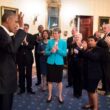Following the Money
“Should the American people put their faith in a white billionaires boys’ club to lead the revolution on behalf of poor people of color?”
The documentary film Waiting for Superman advances a seductive argument: that the solution to the “problem” of public education lies exclusively in innovation that can only be found outside the public schools. As the film moves beyond theaters to viewings organized by civic organizations and education advocacy groups, is has been embraced by a persistent group of education “reformers” who would shift funding from public schools to charter schools — most of which operate outside of the public school system and with far less government oversight than public schools — while receiving public support. Rick Ayers offers a different vision of education reform. Ayers is an adjunct professor of teacher education at the University of San Francisco, and author, with William Ayers, of Teaching the Taboo: Courage and Imagination in the Classroom, from Teacher College Press. —L.D.
SOMEHOW OVER THE LAST 20 YEARS, the idea of educational reform has been taken over by big business right-wingers and neo-liberal ideologues. The term “reform” has been hijacked. Those of us deeply involved with students, communities, and education are in shock, disbelieving what hit us. And, in response to the juggernaut of privatization schemes masking as reforms, we find ourselves recast as the new conservatives, apparently arguing for the status quo and defending all things old fashioned. Indeed, a February New Yorker profile of Education Secretary Arne Duncan cast the debate as one between “free-market reformers” (i.e. the business-centered neo-liberals) and the “liberal traditionalists” (apparently those of us who support a student-centered curriculum).
How did it all go so wrong?
We made a deal with the devil. In our desire to break the deadening bureaucracy that dominates so many school districts, in our need to get free of the go-slow policies that have tied up many teachers’ unions, we made alliances with big foundations and corporations which seemed enthusiastic about small schools, community school boards, and curricular innovation. But now the big money groups have brought down the hammer: no more critical thinking, no more transformative and creative projects. Instead, schools are to be sites of regimentation, driven by standardized tests. Private corporations are invited in to run schools — as they run prisons — for profit. Unions are to be swept aside, putting teachers at the mercy of the new CEOs. Just as students are being required to compete against students in a life and death struggle, new rules are being written to set teachers in competition with teachers, schools with schools, and states with states. It is a neo-liberal wet dream.
The highly resourced documentary, Waiting for Superman, by Davis Guggenheim, is the leading shill for this new vision, tied to a massive propaganda machine designed to be a game changer in the whole school reform debate. Superman paints a picture of our failing schools, with students neglected and not taught. The film is a compelling argument that holds up charter schools such as the Success Academy of the Harlem Children’s Zone and the KIPP schools, as models of schools that work. And it argues that the problem is not a lack of funds for schools. As Guggenheim describes public education, the central problem is bad teachers and the teachers’ unions that supposedly protect these bad teachers from getting fired. These reformers hold up the example of Washington, D.C., former schools chancellor Michelle Rhee, whose celebrated accomplishments have not been substantiated, yet is depicted as a tough CEO for her massive firing of teachers and principals and her attempt to implement the discredited “teacher pay for test scores” policy.
UNDERWRITING REFORM—With this film, the term “reform” is decisively owned by the corporate planners and underwritten by the new money of the bubble billionaires imposing their social vision — through organizations such as the Bill & Melinda Gates Foundation, Walton Foundation of Wal-Mart fame, and the Broad Foundation. Beyond the film, New York’s mayor selects a corporate executive, with no experience in education, as chancellor of the city’s schools. Superintendents are being recast as CEO’s. Education Secretary Arne Duncan rolls out an education plan that is in perfect alignment with this campaign: reducing all school evaluation to test scores, evaluating and compensating teachers based on those test scores, reconstituting schools and firing teachers based on the same metric, and even evaluating teacher-education programs based on subsequent test scores achieved by students who were taught by teachers from that program.
If “not waiting for Superman” has been the battle cry of the corporate reformers, it has generated its own storm of debate, with responses from across the education map. Diane Ravitch, a former leading architect of George W. Bush’s No Child Left Behind legislation, neatly deconstructs Superman‘s premises in a November issue of the New York Review of Books. Virtually all the responses, from classrooms to community activists, are collected on a Web site, NOTwaitingforsuperman.org, established by the education journal Rethinking Schools.
Another interesting consequence of the Superman phenomenon has been that some of the boutique charters have been forced to submit their claims to fact-checking.
A number of publications have attempted to validate Superman‘s data.
The New York Times, the Amsterdam News and other papers have actually done some investigation, and the results have surprised many. It turns out that the millions that Wall Street donated to the Harlem Children’s Zone made the school much more engaging for the children it accepted, but did not really have much impact on test scores — the metric that matters most to these reformers. And the KIPP schools seem to have improved test scores by systematically expelling (“counseling out”) students who were doing badly. It seems that standardized tests, as some of us have said all along, are so calibrated to reflect racial and class-cultural capital that they are of little use in measuring student learning. Not that this matters to the neo-liberal reformers — charter school funders such as Facebook founder Mark Zuckerberg, Maverick Capital, JP Morgan Chase, Goldman Sachs. The test scores were a club they used to invalidate public schools. Their project, to privatize public education, was not derailed even a bit.
A DIFFERENT SCRIPT—Instead of holding the ground as defenders of the status quo, instead of writing article after article responding to the Superman narrative, however, perhaps it is time we imagine our own movie. What would we make if we had Davis Guggenheim’s resources? Let us begin to define and fight for deep and consequential educational change.
To do this, we would be wise to pay some attention to history, because this assault is nothing new and these lines of debate have been going on for some time. Certainly the efforts described by W.E.B. DuBois in establishing public schools throughout the south during Reconstruction point to the key role of education in the struggle for liberation. The pioneering ideas of John Dewey in the early 20th century, about the crucial role of education in a democracy, of constructing deep education projects based on student experience and interest, were often under attack.
Most instructive may be the education battles of the Cold War era. During and after the Depression, many schools developed curricula that were intended to support student development as engaged and empowered citizens, in a program known as “life-adjustment.” It was an approach to teaching similar to Dewey’s and proven effective through Ralph Tyler’s famous “Eight-Year Study” in the 1930s. In 1957, however, the Soviets put the first satellite, Sputnik, into orbit, causing consternation, even panic, among U.S. elites. The U.S. was losing the space race, the arms race! The war department got involved in education and was granted unprecedented powers through the National Defense Education Act.
Admiral Hyman Rickover toured the country, giving a series of speeches insisting that U.S. schools must begin the “de-emphasis of life-adjustment schools and progressive educationalists,” and demanding more uniform standards, more college-level science for high schoolers. The goal of inducting all citizens into a level of scientific literacy was jettisoned in favor of a curriculum that would produce the next Werner von Braun, the next brilliant bomb maker to set against the Soviets.
The Cold Warriors attacked what they called “John Dewey’s socialistic Progressivism” and called for basic education that transmitted our patriotic cultural values, a theme which Education Secretary William Bennett was to repeat in the 1980s. The teachers were ineffective, they declared, we were losing the race with our competitors, teachers were not rigorous enough, and test scores were lagging.
Echoes of all these charges are found in the rhetoric of today’s “reformists.” Waiting for Superman gets a chuckle out of the audience when it pairs a report of American students’ low math test scores with a survey that shows American teens have a sense that they know math well, have high levels of self esteem.
Guggenheim follows this, in case we did not get the point, with some clips of jackass antics, kids riding bikes into walls, accompanied by the music of Green Day’s “American Idiot.” Yes, these darn kids are just coddled. They need an ego-busting, strict-father, beat down. That will do the trick. It’s Hyman Rickover all over again.
But let’s not imagine that the Pentagon elites were the only ones defining the cultural and educational landscape in 1957, just as the corporate elites are not the only voices today. That same year, Terrence Roberts, Elizabeth Eckford, and seven other courageous young black students defied Gov. Orval Faubus to integrate Central High School in Little Rock. They were not focused on the Cold War — they were trying to get an education to elevate their communities. Seven years later, during the Mississippi Freedom Summer Project, organizers Charlie Cobb and Ella Baker articulated a freedom curriculum of questioning the circumstances of African-American communities, based on the premise that the fundamental injury to these youth was “a complete absence of academic freedom and students are forced to live in an environment that is geared to squashing intellectual curiosity and different thinking.”
Also in 1957, Allen Ginsburg’s “Howl” was put on trial as an obscenity. But the poem was more than that. It was a celebration of the id, of passion and caring, in defiance of the controlled and repressive master narrative of society. In 1957 liberation struggles were shaking the old colonial foundations in Vietnam, Algeria, and Cuba – throughout Asia, Africa, and Latin America.
And yet, and yet, some kind of human-oriented idea of education continues to creep back in. Schools are pivotal institutions in our society because they are sites of contention, one of the main places that we work out what we mean by democracy. The history of education is not all Rickover, not William Bennett, not Michelle Rhee. It is also the demands for freedom, the commitment to our children, the howl for love.
By being drawn into the parlor talk with Waiting for Superman, we risk validating their very narrative, even as we oppose it point by point. Let us remember to keep the vision alive, keep the totality of a program of deep education, at least before us, so we may keep our eyes on the prize.
SUPERMAN REDUX—Our challenge, now, is to be not reactive, to not allow this new framing of the issue that casts progressive education activists as traditionalists, conservatives, do-nothing defenders of the status quo. Maybe we need more social activists, not more technicians. Perhaps we need more poets — China in the 8th century chose members of the civil service through poetry tests. That might be worth reviving. I wonder — if we were able to make a documentary like Waiting for Superman. If those who need real education reform the most could make a pitch for the funds to create a blockbuster on education today. What would we say? Here are a few points that would guide us:
- Reform demands empowered communities — not passive recipients of charity from above, but communities that demand the resources and freedom to pursue their deep interests. We need more of Paulo Freire’s transformative education, not top-down command mandates.
- Reform insists that children must be loved and, yes, cared for; they need to be supported through community construction, rites of passage, and the development of life goals.
- Reform means a curriculum of inquiry, questioning, critical thinking, curiosity, imagination. It emphasizes civic discussion, and social ethics. It places a high priority on music and the arts as well as new digital media. It demands assessments that reflect the complexity and reality of student performance in schools — not standardized tests but projects, portfolios, and actual work in the real world.
- Reform means science and math curricula that are meaningful, engaging, and rigorous instead of the dreary regime of memorized formulas and the unscientific notion that we are teaching settled, decontextualized truths.
- Reform recognizes how crucial it is that society reprioritize allocation of resources, funding education and recreation for youth. We are not in a time of scarce resources, not if we factor in the trillions wasted on war and prisons — the shame of our society which is strangling our educational budgets.
- Reform means real respect for the profession of teaching, supporting collegiality and initiative among teachers while at the same time inviting in a much broader array of community activists, local experts, and treasured elders to the classroom.
These approaches to education, marginalized as taboo and so much fluff by the corporate elites, will support the next generation. Youth must be invited not to simply fill the slots in the empire as it is now constructed, but to help envision a future of deeper humanism and caring and to acquire the tools to help build that future.
—With Lou Dubose






0 Comments